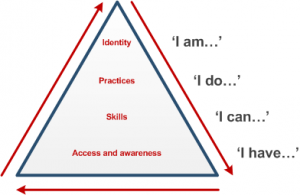When I read that I needed to set up a blogger site as part of the course requirements, I initially thought it would be hard. But, as it turned out, I was able to set up the WordPress site and connect it to a domain in a few minutes.
I have enjoyed the scenario for the first topic and have been looking at the broader perception of online participation. I have included a presentation to share what I gained from reading about Marc Prensky and his digital immigrants and natives ideas. I have also explored on the expanded works of White and le Cornu (2009) about the digital resident and visitor.
Included in our first webinar, I was so excited to attend David White and his clear inspiration about our proper focus when we start to imagine our online presence and that of our students. I reflected on the requirements to set up a blog site and began shaping my journey and questioning whether I am a digital visitor or a resident?
As I am currently navigating institutional and personal spaces, it was becoming clear that I am adjusting my involvement in those digital spaces, and it is never constant but fluid and moving. Here I stumbled upon prolific writing and concepts from Martin Weller.
I include an interview with Martin Weller to discuss “openness” and how we see our understanding of being open in a digital space. Weller uses the terms “openness” and “networks.” As it becomes imperative to share your thoughts and ideas, it cannot sit in isolation on your PC as an example. Still, it needs to be published and distributed online like a conversation is shared with another person/s. The UN terms our era “the Network Age”, with data access causing “decentralised decision making” (UNOCHA, 2013, pg. 9), with a transformative social impact.
Beetham and Sharpe’s framework (2010) describes digital literacy as a development process from access and functional skills to higher-level capabilities and identity.

Beetham and Sharpe’s pyramid model’ of digital literacy development model (2010)
The above and other models are valuable tools for raising awareness and starting discussions around digital literacies to develop a shared understanding and goals. In addition, the literature and research have expanded my knowledge of the topic and my interest in knowing more.
Reference List:
http://www.marcprensky.com/writing/Prensky%20-%20Digital%20Natives,%20Digital%20Immigrants%20-%20Part1.pdf and http://www.marcprensky.com/writing/Prensky%20-%20Digital%20Natives,%20Digital%20Immigrants%20-%20Part2.pdf.
Prensky, 2001a, p. 1; emphasis in original.
David White, Marion Manton and Allison Le Cornu, 2009. “The Isthmus Project: Headline Findings Report” (31 March), at http://isthmus.conted.ox.ac.uk/raw-attachment/wiki/ProjectDocumentation/IsthmusHeadlines.doc, accessed 26 March 2022
The Impact of Digital Technologies | United Nations accessed 26 March 2022
Ferguson, Rebecca;
Coughlan, Tim; Egelandsdal, Kjetil;
Gaved, Mark;
Herodotou, Christothea; Hillaire, Garron; Jones, Derek; Jowers, Iestyn;
Kukulska-Hulme, Agnes;
McAndrew, Patrick; Misiejuk, Kamila; Ness, Ingun Johanna;
Rienties, Bart;
Scanlon, Eileen;
Sharples, Mike; Wasson, Barbara;
Weller, Martin and
Whitelock, Denise (2019).
Innovating Pedagogy 2019: Open University Innovation Report 7. The Open University, Milton Keynes.